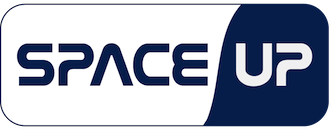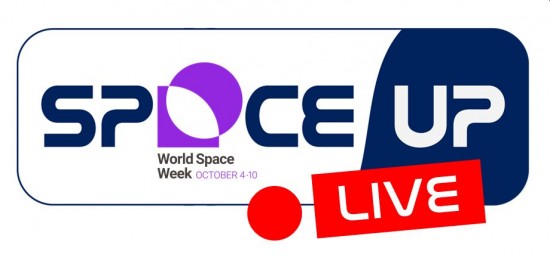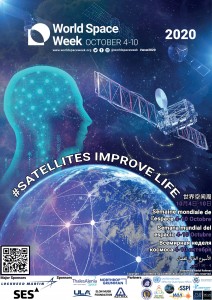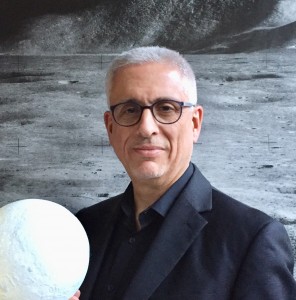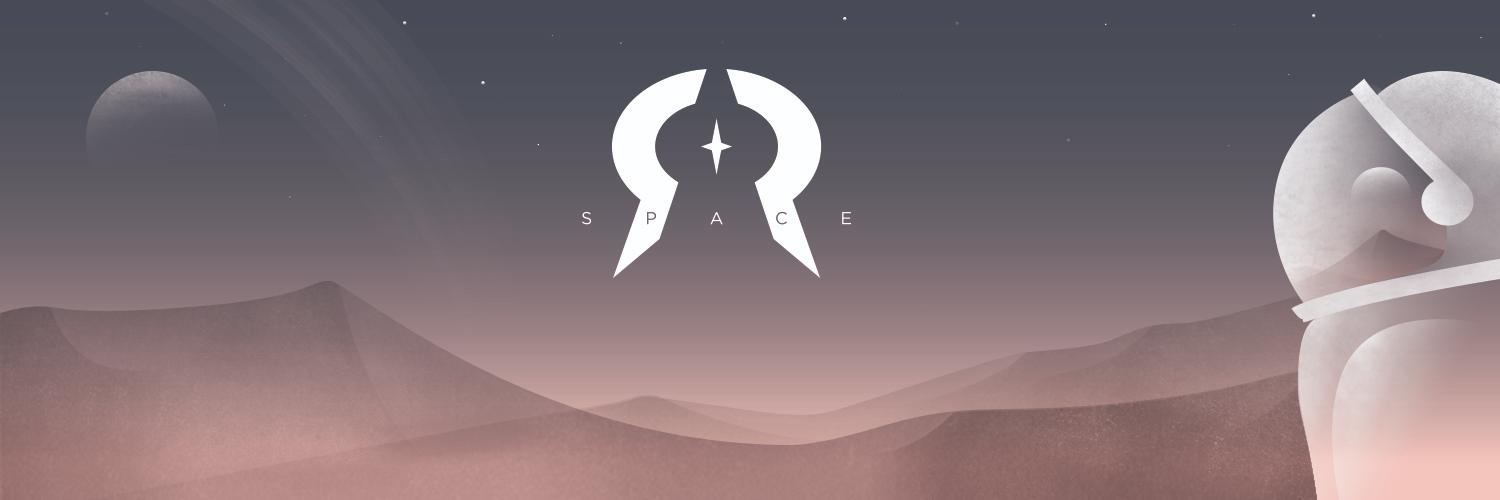Join us for the third edition of SpaceUp LIVE! SpaceUp LIVE is an online version of the global “space unconference” SpaceUp. It is a brilliant way to spend time with collaborators all over the world, without leaving your home, sharing your passion for space. Registration is now open via Eventbrite.
The event will be online,on Wednesday 7 October 2020, from 17:00 to 20:00 BST (18:00-21:00 CET, 12pm-3pm EDT)
Add the event to your Google Calendar, Apple Calendar, join our Facebook Event or set a YouTube Live Reminder.
How does it work?
- 15th May: Registration opens - call for proposals
- 5th October
30th September: Call for proposals closes - 6th October
2nd October:We let successful applicants know if they will present. All others are invited to join the interactive Q&A - 7th October: SpaceUp LIVE
What if I don’t want to present?
YouTube Live Link
World Space Week 2020
More than 8,000 events in 96 countries celebrated “The Moon: Gateway to the Stars” in 2019. This year the theme for World Space Week is “Satellites Improve Life.”
“The General Assembly declares 4 to 10 October World Space Week to celebrate each year at the international level the contributions of space science and technology to the betterment of the human condition” – UN General Assembly resolution, 6 December 1999
What is World Space Week?
World Space Week is an international celebration of science and technology, and their contribution to the betterment of the human condition. The United Nations General Assembly declared in 1999 that World Space Week will be held each year from October 4-10. These dates commemorate two events:
- October 4, 1957: Launch of the first human-made Earth satellite, Sputnik 1, thus opening the way for space exploration
- October 10, 1967: The signing of the Treaty on Principles Governing the Activites of States in the Exploration and Peaceful Uses of Outer Space, including the Moon and Other Celestial Bodies.
PROGRAMME
Introduction
Prof. Chris Welch – Vice Chair and board member of the World Space Week Association (@profchriswelch)
Chris Welch is Professor of Space Engineering and Head of the Space Payloads Laboratory at the International Space University.
Chris is a former Vice-President of the International Astronautical Federation and is a Fellow of the Royal Astronomical Society, the Royal Aeronautical Society and the British Interplanetary Society, and is currently Vice-Chair of the World Space Week Association and an advisor to the Moon Village Association and the Initiative for Interstellar Studies.
Although technically a physicist-turned-engineer, Chris considers himself a ‘spaceist’, interested in all aspects of space. He has extensive media experience and is also well-recognised for his space education and outreach activities, receiving the 2009 Sir Arthur Clarke Award for Space Education.
Chris a PhD in Spacecraft Engineering (Cranfield University), an MSc in Experimental Space Physics (University of Leicester) and a BSc in Physics (Cardiff University). His main research interests are in space systems and space exploration, the latter from an interdisciplinary perspective.
Chris was in the final twenty-five finalists for the 1991 Juno mission to the Russian Mir space station and still hopes to get to space. He has written what he believes to be the first-ever paper on the design of extraterrestrial gardens and has a poem on the International Space Station which has now orbited the Earth more than 12500 times.
Talks
Grid sessions
- Samiksha Raviraja, University of Leicester (@sandysami123) – “Space for Equality and Inclusion”
- Aastha Mathur, University of Leeds Business School – “Exploring Methods to Improve the Gender Balance in SpaceUp Leicester and SpaceUp LIVE Events”
- Barath Kumar, Student– “Space for Everyone: What does it mean and how do we get to space being for everyone?”
T-5s
- Anita Bernie, KISPE Space Systems Limited (@anitabernie @SatelliteOpen) – “Open Source? In Space? How is that possible?”
- Martina Lofqvist, Momentus (@martinalofqvist @MomentusSpace)– “In-space transportation”
- Rochelle Velho, NHS, OeWF, SGAC SMLS, UK LABS (@astro_marsrocky) – “Celestial bodies – monitoring the human brain in space”
- Heidi Thiemann, Space Skills Alliance (@spaceskills @heidi_teaman) – “Space Census 2020”
- Natasha Allden, Multiply Space (@MultiplySpace) – “Space Technology Transfer: Addressing the Barriers”
Panel discussion – A World Without Satellites
This panel will try to paint a picture of what the modern world would look like without satellites. It will explore the impact on finance, business, safety and rescue along with how our everyday lives would be different.
Michelle Mendes, SatCan Executive Director
Michelle Mendes is an innovation strategy leader focussed on commercial space. She is the Executive Director of the Satellite Canada Innovation Network with over 20 years of experience in business, finance and law. In her career, she has advanced space commerce in Canada by leading programs and advocating for policies that support commercial space companies. She has also worked on behalf of the United Nations to further space advocacy and strengthen international space policy and law. Michelle sits on the Government of Canada Space Advisory Board, on Canada’s Global Affairs Remote Sensing Space Systems Act Advisory Committee, Western University’s Institute for Earth and Space Exploration (Western Space) Advisory Board and on the Board of C-Core. She holds a Bachelor of General Studies degree from Simon Fraser University in Canada, is a Fellow Chartered Secretary in Canada and UK and holds an Executive Master of Business Administration in Space Commerce from the International Space University in Strasbourg, France.
Agnieszka Łukaszczyk – Senior Director European Affairs, Planet
Agnieszka Lukaszczyk is a Senior Director for European Affairs at Planet. A Polish/American national, has worked at the European Commission, Directorate General for Internal Market, Industry, Entrepreneurship and SMEs, Space Data for Societal Challenges and Growth Unit. She also worked at the Directorate General for Enterprise and Industry, Space Policy and Research Unit. Before she joined the Commission, Agnieszka was the Brussels Office Director for the Secure World Foundation. In addition, she is the former Chairperson and the former Executive Director of the Space Generation Advisory Council in Support of the United Nations Programme on Space Applications. Agnieszka also worked at the European Space Policy Institute as a research fellow. Agnieszka serves as the Vice President – Europe for the World Space Week And Sits on the Board Of Directors for the Women in Aerospace-Europe. She is currently pursuing a PhD in Space Security at the Polish Defence Academy. She holds a Master’s degree from the Warsaw School of Economics in Management of Space in New Economies and a Master’s degree from the American University School of International Service in International Politics plus a Bachelor degree in Political Science from the University of Tennessee. She also studied at the Universite Catholique de Louvain in Brussels, Belgium; the Jagiellonian University in Krakow, Poland and the World Trade Institute in Berne, Switzerland. She gained professional experience at the Political Section of the Polish Embassy in Washington DC, American Electronics Association in Brussels, European Department of the Polish Senate in Warsaw and the Warsaw Business Journal.
Daniel Porras – Director of Strategic Partnerships & Communications, Secure World Foundation
Daniel Porras is the Director of Strategic Partnerships and Communications at the Secure World Foundation, where he works to bring partners together towards developing sustainable space activities. Previously, Mr. Porras was the Space Security Fellow at the UN Institute for Disarmament Research, where he focused on political and legal issues surrounding space security. His main focus has been on the progressive development of sustainable norms of behaviour for space activities. Mr. Porras conducted research on the emergence of new technologies and approaches to strategic stability in outer space. He was the resident technical expert for multiple UN bodies working on space security issues, including the Group of Governmental Experts on the Prevention of an Arms Race in Outer Space. He speaks English, French, Italian, and Spanish. Mr. Porras’ areas of expertise include international space law and policy, emerging technology threats, international law, and political science. Mr. Porras holds an LL.M in International Economic Law from Georgetown University Law Center (Washington, DC).
Emma A Taylor - Past-Chair, Safety and Reliability Society
Dr Emma Taylor is an award-winning chartered engineer with 30 years of experience in space, energy and transport. Starting her career as a graduate apprentice in 1989 with British Aerospace Space Systems, in 1995 she went to the International Space University Summer Session, returning to complete her PhD on hypervelocity impact on spacecraft structures (and the Hubble Space Telescope). Working at the European Space Agency and then Europe’s largest space company, as a Principal Engineer she led the ISO team developing the standard for mitigation of orbital debris. Over the next 15 years, Emma led teams that assessed risk and resilience for spacecraft, then onshore and offshore energy operations for some of the world’s largest companies. Her contribution to engineering was recognised in 2018 as one of the Daily Telegraph Womens Engineering Society Top 50 Engineers, also raising the profile of engineering ‘lattice’ careers which include career breaks for caring.
Through her leadership of the Safety and Reliability Society, a Professional Engineering Institution she has organised multi-discipline events on a wide variety of topics, including “Safety in Space” and cybersecurity. Elected Fellow of the Institution of Mechanical Engineers, Safety and Reliability Society, Royal Astronomical Society and the Royal Society for the Arts Manufactures and Commerce, Emma has mentored widely and is now proud to lead a cross-sector team of engineers who are awarding professional registration under licence from the UK Engineering Council. Recognised by Cranfield School of Management as one of 100 #WomentoWatch with the potential for FTSE350 board roles, she is committed to building a bridge between engineering and business, promoting the benefits of risk management and how it can contribute to societies’ sustainability and resilience. She currently works with the transport sector to strengthen asset integrity, with a focus on digital operations, and increasingly is finding herself having technical conversations that bridge rail, space and cybersecurity. Passionate about risk, she uses her public profile to raise awareness of the importance of protecting the orbital environment, and preserving access for future generations.
GRID
Sponsor – Spacebit (@SpacebitOne)
Spacebit is a privately held UK company that is working on space data analytics tools and robotic concepts of space exploration that include AI and advanced micro-robotics. Spacebit company is sending the first UK rover to the Moon in 2021. This is undoubtedly an unprecedented event in the history of British space exploration and science in general. Our goal is to create new opportunities for industry, academia, and helping with future development of new infrastructure and commercial resource exploration on the Moon and beyond.
Visit: https://spacebit.com
Organiser – R&R Space (@randrspace @spaceupleics)
It is the mission of R&R Space to push the boundaries of space technology and innovation by engaging people and ideas. We achieve this through new and exciting concept events and training. It is our aim to inspire a new wave of entrepreneurs and space explorers by unlocking their potential and linking them with new skills to build the future of space. R&R Space is founded by two space enthusiasts and aspiring entrepreneurs, Ryan Laird (@rjmlaird) and Ryan Bradley-Evans (@astro_ryanbe) who share a common vision of humanity’s place in space. R&R Space are the organisers of SpaceUp Leicester. They use SpaceUp as a means to start the discussion around the topic of space, building a sense of community and a hub in the region for this growing industry. The aim is to spark some creative ideas that could lead on to future projects and activities in the region and beyond.
